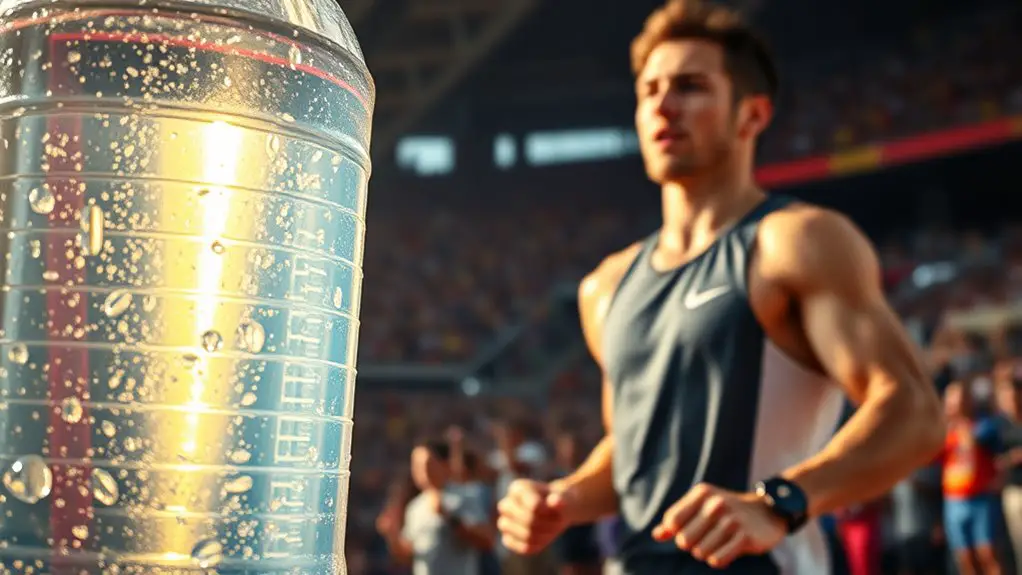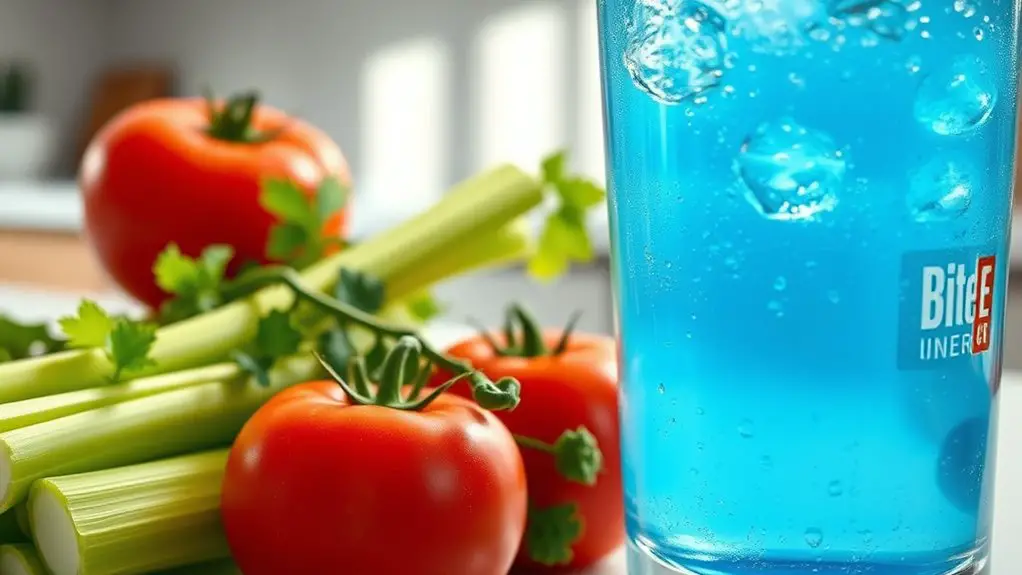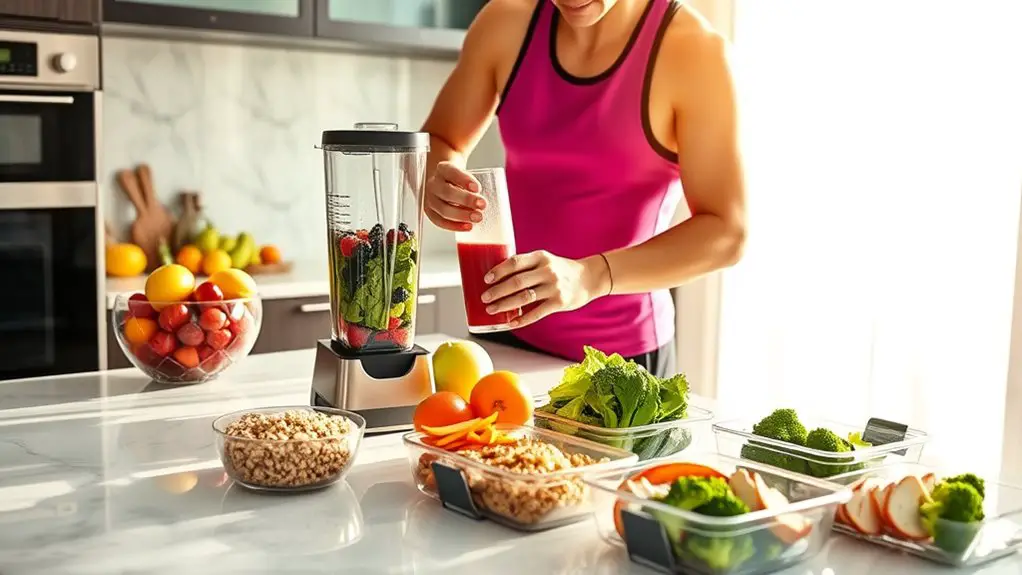Hydration plays an essential role in your performance as an elite athlete. It affects strength, endurance, and focus, all significant for success. Dehydration can lead to fatigue, muscle cramps, and reduced concentration, which can stumble your game. Different sports require tailored hydration strategies, from regular fluid intake during long runs to quick sips during basketball breaks. Knowing when and what to drink is key to maintaining peak performance. Discover more strategies to optimize your hydration.
The Importance of Hydration for Athletic Performance
When you're pushing your limits in elite-level athletics, staying hydrated isn't just important—it's essential. Your body craves water to perform at its peak, and dehydration can hinder your strength, endurance, and focus. Imagine feeling sluggish, your muscles cramping, or your mind foggy just when you need to be sharp. That's what dehydration does.
Hydration helps regulate your body temperature, ensuring you can keep going even when the heat's on. It also supports nutrient transport, so your muscles get what they need to recover and grow. Plus, staying properly hydrated can enhance your reaction times and decision-making—key elements when you're competing at high levels. By keeping a water bottle accessible, you can encourage consistent hydration throughout your training and competitions.
Understanding Fluid Needs for Different Sports
Hydration needs can vary considerably based on the sport you're engaged in, as different activities place unique demands on your body. For instance, if you're running long distances, you'll likely need to replenish fluids more frequently due to sweat loss. On the other hand, if you're playing a sport like basketball, your hydration should be timed around breaks to maintain peak performance.
In sports that last several hours, like soccer or marathons, electrolytes become essential to replace what's lost. If you're into strength training, shorter but more intense sessions might mean you don't need as much fluid during the workout itself, but recovery hydration is key afterward. Staying aware of signs of dehydration allows athletes to adjust their fluid intake proactively and avoid performance dips.
Understanding these nuances allows you to tailor your fluid intake, ensuring you stay energized and ready for whatever challenge comes next. So, listen to your body and adjust your hydration strategy to fit your sport's demands—it's all about maximizing your performance!
Signs and Symptoms of Dehydration
When you're pushing your limits in training or competition, it's essential to recognize the signs of dehydration. Physical symptoms like fatigue and dizziness can sneak up on you, but cognitive effects, such as decreased focus and reaction time, are just as important to notice. Staying aware of these indicators can help you maintain peak performance and avoid serious health issues. Additionally, proper electrolyte balance is crucial for preventing dehydration-related cramps and ensuring optimal muscle function.
Physical Symptoms to Watch
As you push your limits in elite-level athletics, recognizing the signs and symptoms of dehydration becomes essential for maintaining peak performance. Pay attention to your body. If you notice increased thirst, dry mouth, or dark yellow urine, these are early indicators you might be dehydrated. Fatigue, dizziness, and muscle cramps can signal that your hydration levels are off. You might also experience headaches or a reduced ability to concentrate, which can seriously impact your performance. Don't ignore these physical signs; they're your body's way of telling you something's wrong. Staying in tune with these symptoms will help guarantee you stay at your best, allowing you to chase your goals without the burden of dehydration holding you back.
Cognitive Effects of Dehydration
Dehydration doesn't just affect your body; it can seriously impair your cognitive function, too. When you're low on fluids, your mental sharpness takes a hit, leaving you feeling sluggish and unfocused. Here are some signs to watch out for:
- Reduced Concentration: You might find it hard to focus on tasks.
- Increased Fatigue: A lack of energy can make even simple decisions feel exhausting.
- Memory Issues: You may struggle to recall information or stay on task.
- Mood Swings: Irritability or anxiety can creep in, affecting your overall performance.
Staying hydrated is key to keeping both your body and mind in peak condition. Don't underestimate the power of water on your cognitive abilities!
Optimal Timing for Hydration
When it comes to hydration, timing can make all the difference in your performance. To maximize your endurance and efficiency, you need to focus on pre-event hydration strategies and understand the importance of fluid replacement during the event. Proper hydration is essential for maintaining energy levels and preventing sluggishness during competition. Let's explore how to effectively manage your hydration schedule to keep you at your best.
Pre-Event Hydration Strategies
To guarantee peak performance, it's crucial to comprehend the ideal timing for hydration leading up to an event. Staying hydrated before your competition can make a world of difference. Here are four strategies to help you optimize your pre-event hydration:
- Hydrate Early: Start sipping water or electrolyte drinks at least 2-3 hours before your event.
- Monitor Color: Check your urine color; aim for pale yellow, indicating adequate hydration.
- Avoid Overdoing It: Don't chug large amounts right before you compete; it could lead to discomfort.
- Top Off: About 20-30 minutes before your event, drink a small amount to make sure you're topped off without feeling bloated.
Implementing these strategies can help you feel light, energized, and ready to conquer the event ahead!
During-Event Fluid Replacement
After ensuring you're well-hydrated before your event, the focus now shifts to maintaining that hydration during competition. Timing is key; you don't want to wait until you're thirsty. Instead, aim to drink small amounts regularly, ideally every 15-20 minutes. This helps keep your fluid levels steady and supports performance. Choose a mix of water and electrolyte drinks to replenish lost minerals. Listen to your body—if you feel fatigued or dizzy, it's a sign you need more fluids. Always have a hydration plan tailored to your event's demands and your personal needs. By staying proactive about your hydration during the event, you're free to focus on performing at your best without the distraction of thirst or fatigue.
Types of Hydration Fluids: What to Choose?
Choosing the right hydration fluid can make a significant difference in your performance and recovery. With so many options out there, it's crucial to know what works best for you. Here are four types of hydration fluids to evaluate:
- Water: The simplest choice, great for everyday hydration. Perfect if you're doing light workouts.
- Electrolyte Drinks: These help replenish minerals lost during intense exercise, keeping you balanced and energized.
- Sports Drinks: Designed for endurance athletes, they provide carbs and electrolytes to fuel you through long events.
- Coconut Water: A natural alternative, rich in potassium and low in calories, invigorating and hydrating.
It's important to replenish electrolytes during long workouts to prevent fatigue and maintain stamina. Experiment with these options to find what makes you feel your best. Hydration isn't one-size-fits-all, so listen to your body and choose what aligns with your performance goals. Enjoy the freedom to explore and discover what works for you!
Strategies for Maintaining Hydration During Training and Competition
While staying hydrated might seem straightforward, it requires intentional strategies, especially during training and competition. First, create a hydration plan tailored to your needs. Know your sweat rate and drink accordingly—aim for about 16-20 ounces of fluid a few hours before you start. During training, sip small amounts regularly instead of gulping large quantities.
Consider using electrolyte-rich drinks to replenish lost minerals, but be mindful of sugar content. Carry a reusable water bottle to keep hydration within easy reach. Set reminders on your phone to drink at intervals, especially during long sessions.
Listen to your body; thirst is your first cue, but don't wait until you're parched. Additionally, hydration is crucial for optimal body function, ensuring that your performance remains at its peak. Finally, practice your hydration strategy during training to guarantee it works for you on competition day. By embracing these strategies, you can enjoy the freedom to perform at your best without the burden of dehydration.
Frequently Asked Questions
How Does Hydration Affect Mental Performance in Athletes?
Hydration's essential for your mental performance. When you're well-hydrated, you'll think clearer, focus better, and react faster. Dehydration can lead to fatigue and decreased cognitive function, making it harder to perform at your best.
Can Hydration Impact Recovery Time After Intense Exercise?
Yes, hydration can greatly impact your recovery time after intense exercise. Staying properly hydrated helps reduce muscle soreness, improves nutrient transport, and supports overall bodily functions, allowing you to bounce back faster and feel your best.
What Role Does Humidity Play in Hydration Needs?
Humidity can greatly affect your hydration needs. When it's humid, you sweat more, losing fluids faster. You've gotta drink more to maintain balance and prevent dehydration, so listen to your body and stay aware.
Are There Any Risks of Over-Hydration for Athletes?
You could drown in water if you over-hydrate! While staying hydrated's essential, excessive intake can lead to electrolyte imbalances and health risks. Listen to your body and balance fluid intake for ideal performance.
How Do Age and Gender Influence Hydration Needs?
Age and gender can greatly affect your hydration needs. Generally, older adults might need more fluids due to decreased thirst, while women may require different amounts based on hormonal changes. Stay attuned to your body's signals.




